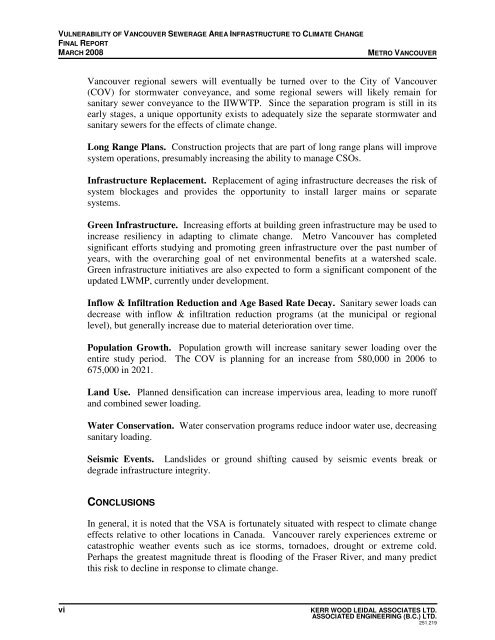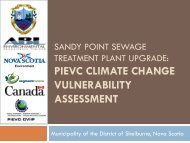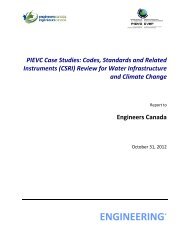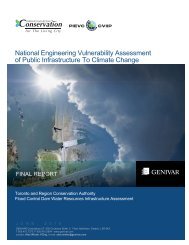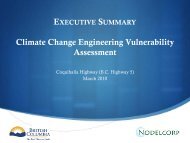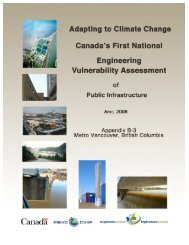EXECUTIVE SUMMARY - Vulnerability Committee
EXECUTIVE SUMMARY - Vulnerability Committee
EXECUTIVE SUMMARY - Vulnerability Committee
Create successful ePaper yourself
Turn your PDF publications into a flip-book with our unique Google optimized e-Paper software.
VULNERABILITY OF VANCOUVER SEWERAGE AREA INFRASTRUCTURE TO CLIMATE CHANGEFINAL REPORTMARCH 2008METRO VANCOUVERVancouver regional sewers will eventually be turned over to the City of Vancouver(COV) for stormwater conveyance, and some regional sewers will likely remain forsanitary sewer conveyance to the IIWWTP. Since the separation program is still in itsearly stages, a unique opportunity exists to adequately size the separate stormwater andsanitary sewers for the effects of climate change.Long Range Plans. Construction projects that are part of long range plans will improvesystem operations, presumably increasing the ability to manage CSOs.Infrastructure Replacement. Replacement of aging infrastructure decreases the risk ofsystem blockages and provides the opportunity to install larger mains or separatesystems.Green Infrastructure. Increasing efforts at building green infrastructure may be used toincrease resiliency in adapting to climate change. Metro Vancouver has completedsignificant efforts studying and promoting green infrastructure over the past number ofyears, with the overarching goal of net environmental benefits at a watershed scale.Green infrastructure initiatives are also expected to form a significant component of theupdated LWMP, currently under development.Inflow & Infiltration Reduction and Age Based Rate Decay. Sanitary sewer loads candecrease with inflow & infiltration reduction programs (at the municipal or regionallevel), but generally increase due to material deterioration over time.Population Growth. Population growth will increase sanitary sewer loading over theentire study period. The COV is planning for an increase from 580,000 in 2006 to675,000 in 2021.Land Use. Planned densification can increase impervious area, leading to more runoffand combined sewer loading.Water Conservation. Water conservation programs reduce indoor water use, decreasingsanitary loading.Seismic Events. Landslides or ground shifting caused by seismic events break ordegrade infrastructure integrity.CONCLUSIONSIn general, it is noted that the VSA is fortunately situated with respect to climate changeeffects relative to other locations in Canada. Vancouver rarely experiences extreme orcatastrophic weather events such as ice storms, tornadoes, drought or extreme cold.Perhaps the greatest magnitude threat is flooding of the Fraser River, and many predictthis risk to decline in response to climate change.viKERR WOOD LEIDAL ASSOCIATES LTD.ASSOCIATED ENGINEERING (B.C.) LTD.251.219


